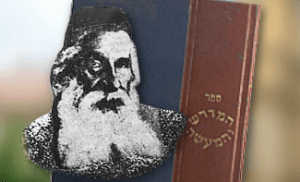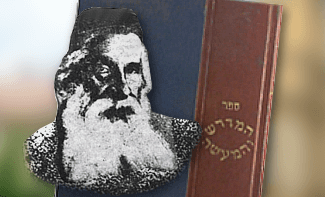
Two people remained in the camp…The spirit rested upon them, and they prophesied in the camp…He [Yehoshua] ran…”Eldad and Medad are prophesying in the camp.”[2]
We are well acquainted with the ominous message in their prophecy: “Moshe will die, and Yehoshua will lead them [the Jewish people] into the Land.”[3] Yehoshua’s proposal to Moshe is not as familiar. Commenting on “My master, Moshe – kela’eim!” Chazal[4] see the word kele / prison is instructive. Yehoshua asked that Moshe imprison Eldad and Medad.
Now, imprisonment seems appropriate enough for the gatherer of wood on Shabbos,[5] and the blasphemer.[6] In both cases, some halachic issue had to be resolved. Prison was not prescribed as punishment for the crime, but to ensure that the offender could be dealt with by the court. The offender had to be remanded to custody to prevent him from escaping in the interim. That does not appear to be what Yehoshua had in mind. It appears that he wished them locked up as a form of punishment – something we do not find elsewhere! Why would Yehoshua find the need to create a new form of punishment, not ordinarily prescribed by the Torah?
Perhaps it was not punishment after all. Perhaps Yehoshua thought that the two nevi’im were not so different from the mekoshesh eitzim and the megadef.
Seers of the future come in two varieties in Tanach. In the early history of our people in the Land, they were called ro’im – those that saw. In those days, the core ideas and values of a Torah nation were well-known. Alien ideas had not yet filtered in from the surrounding nations and cultures. The navi – the seer who spoke truth to power, who carried the burden of a Divine message or forewarning to large groups of people –was unknown. There were people who lived a spiritually lofty existence, and devoted themselves to guiding individuals who needed assistance. Some of them were blessed with insight and vision from beyond. They were not called nevi’im, however, but ro’im. They were humble and unassuming; they remained private about their accomplishments.
With the passage of time, the nation needed powerful and public critics to jolt them out of complacency. A new kind of figure emerged, whose role was far more public than that of the roeh. When these people – nevi’im – began to appear, the people did not immediately turn to them. Shaul, needing to find his lost animals, looked for a “roeh,”[7] not for a navi.
The people were loath to listen to these teachers without their first establishing their credentials and their authority by making accurate predictions about the future. Before the events that the navi predicted came to be, his status was unclear. He might be a charlatan, a pretender, and his prediction would not come to pass. Only after making a series of predictions was he accepted as genuine.
Eldad and Medad lived before any of this happened. It is significant that in their first foray into prognosticating the future, they are described as prophesying – menavim – not just seeing. They seemingly propelled themselves to a role that would be needed only much later in the history of the people. To function as nevi’im, however, meant that they would have to prove themselves. Until that happened, they were to be regarded with skepticism. Only time would tell if they were not false prophets, who deserved to be executed. Yehoshua argued that they should be imprisoned until their mettle could be proven. Just as the mekoshesh and megadef were held in custody until their status could be ascertained, so should Eldad and Medad be treated.
Moshe, however, did not accept Yehoshua’s argument. The mekoshesh and megadef were presumptively guilty of a major crime. Only their punishment was in doubt. There was no great harm in jailing them. There was no reason, however, to treat the would-be prophet as a criminal. If the community jailed every new prophet, who would agree to become one? If a navi brought a Divine message about an event that would occur decades in the future, should he spend much of his life in jail, waiting to demonstrate the accuracy of his predictions?
Moshe may have had something else in mind as well. Hearing a dire prediction of his own death did not disturb him. He had faced harder challenges and greater stakes. Each time, his prayer had been successful; he had created space for Hashem’s midah of rachamim / compassion to take hold. Moshe knew that even if a genuine prophet spoke of some future evil decree, Hashem could choose to nullify it. Moshe felt that if there was room for rachamim, he had a good chance of being able to elicit it.
While a nevuah portending something unpleasant can be rescinded, one promising future good cannot. This means that a mixed nevuah – one that promises something good for one recipient, but bad for another – will not be rescinded. Moshe rejected Yehoshua’s plea to jail Eldad and Medad before he had finished reporting on what they said. (This is what Chazal mean when they say,[8] “They did not conclude the matter before him.” He had heard the prediction of his death, but not that Yehoshua would succeed him.) Yehoshua, who had heard, was therefore more concerned for Moshe’s honor that Moshe was, and wanted to see Eldad and Medad incarcerated, in the event that they were false prophets.
(Chazal[9] relate that when Yeshaya prophesied future doom to Chizkiyah, the latter told him, “End your prophesying and leave!” This was not a sharp rebuke to the navi Hashem. What he meant was that Yeshaya should not utter words that name Chizkiyah’s successor. Were he to do so, there could be no taking back of the gezerah against him.)
Moshe rejected Yehoshua’s plan. He argued that it would be counterproductive! Ha-mekaneh atah li might not mean “will you be jealous on my behalf,” as Rashi has it. Rather, it might mean “will you be jealous against me!” In other words, if Eldad and Medad would be jailed pending the outcome of their prediction, then Moshe’s death would be good for them. It would gain their freedom! A promise of future good is not rescinded; this would seal Moshe’s fate, because it would not leave room for his tefillah.
Speaking in praise of Eldad and Medad, Chazal[10] tell us that because they “diminished themselves,” their prophecy did not cease, while that of the other seventy did. Three opinions follow, about what they predicted: the death of Moshe, the slav, and Gog u-Magog. We can explain along the lines we have developed. Eldad and Medad counted heads. They realized that Moshe had selected two people beyond the required seventy. Two people would be severely embarrassed when they alone would be sent back to the community as apparently unsuccessful and unworthy candidates.
To spare those two the embarrassment, they hid themselves so that the remaining seventy would be the ones chosen. To reward them, HKBH placed them in an entirely different position. The other seventy ceased prophesying. They remained ro’im, seers, but not conveyers of Divine predictions and warnings. Eldad and Medad, however, did not cease. Rather, they assumed roles like the future nevi’im, speaking of events in the future that would impact the entire nation.


